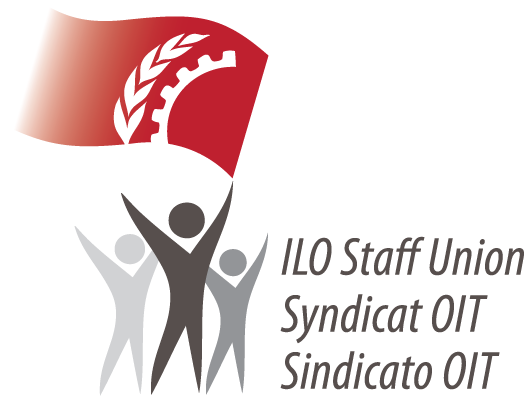General Meeting of the ILO Staff Union – Thursday 25 February 2021, by videoconference
Category : Message68
In light of the Covid-19 pandemic and the restrictions on ILO access for staff, most of them teleworking, the General Meeting of the ILO Staff Union to draw up the programme for the current year was held by videoconference. Sandhu Gurchaten was elected chair of the meeting.
Remarks by the Chairperson of the Staff Union Committee
Union Chairperson Catherine Comte-Tiberghien began the meeting by recalling that the previous day, the Committee had met by videoconference with Guy Ryder, Director General. Traditionally held at the beginning of each year, this meeting was open to all staff, thanks to video technology but also to the Committee’s desire to involve staff as much as possible in this type of interaction where no confidentiality is involved. She also recalled that in November 2020, a global meeting of Union Stewards – again by videoconference – had set out the Union’s objectives for the next five years. In her view, the Union must constantly reinvent itself, especially in this period of crisis, to further its objectives and means of action.
Social dialogue and action plan
In the programme of action proposed to participants in the General Meeting, priority was given to social dialogue within the house, the cornerstone of all other action. During this year of pandemic, dialogue has functioned at headquarters in the interests of both the Office and the staff. This was essential in view of the teleworking that had been in place for many months. The meetings were positive. Other priorities identified and outlined by the Chairperson for the coming year included job security, career development, occupational health and safety, staff mental health, equity in personnel policies in the different workplaces (between headquarters and the field offices), the future of the Organization after the Covid-19 pandemic, and the protection and independence of the international civil service. The Union needs to become stronger and better organized; and information needs to flow more easily among members in the different offices.
Remuneration and job security
On the status and remuneration of officials, Catherine Comte-Tiberghien referred to the deadlock around cost-of-living surveys in various duty stations; the International Civil Service Commission (ICSC) had undertaken to review the evaluation methods. She also mentioned that only the ILO had introduced a collective bargaining process between staff and the administration, while other organizations continued to be governed by the operation of so-called joint bodies. Precarious contracts had proliferated in recent years and the question arose of end-of-contract compensation for the staff concerned. A campaign is under way for the creation of an unemployment insurance scheme.
In this regard, François Kientzler, Executive Secretary of the Former Officials Section, recalled that on an experimental basis, unemployment insurance had been contracted in the past with an external agency, but after a short period of operation it was stopped because of the high cost of the insurance for the staff concerned. In his view, the compensation of staff on limited contracts in the event of termination of employment would be the responsibility of the employer itself, as is the case in some countries where the State is obliged to compensate its employees when they are separated.
Meeting with the Director General
After the adoption of the programme of activities and budget, the Union Chairperson returned to the topic of the previous day’s meeting with the Director General. At a time when the watchword is “One ILO”, one of the concerns put to the DG was the unequal treatment of staff in different duty stations; equity is not respected; staff are often disillusioned and demotivated. This is also the case for staff involved in technical cooperation programmes, where financial issues take precedence over human aspects. The situation at the Turin Centre is also tense; collective bargaining to find adequate solutions is struggling to function. The DG should become more involved in the effective functioning of collective bargaining in the field offices.
Other issues raised
In duty stations like Ankara, cost-of-living issues are essential for local staff, given variations in exchange rates. Staff in external offices must remain protected by ILO health insurance, and outside solutions with private, for-profit companies do not provide coverage in line with the Organization’s ideals and principles. The hiring of interns has been suspended for the past year while staff are working from home; the policy on interns has been supported by the Union, which had secured remuneration for them.
Intervention by the Executive Secretary of the Former Officials Section
Under “Other business”, François Kientzler referred to the situation of pensioners – 2,500 are listed in the Office’s register of retired staff – not all of whom receive high pensions, especially widows. Healthcare costs are exploding in Switzerland, while pensions have not been upgraded for several years. The social life of pensioners is greatly affected by Covid-19 and they often suffer depression, with few positive prospects other than vaccination. Despite operational difficulties, the Bureau of the Former Officials Section stands ready to respond to all requests from retired officials, continuing to communicate with them by email and telephone, as well as keeping them informed via the website in particular.
Concluding the meeting, Catherine Comte-Tiberghien thanked participants and particularly the chair. She hoped that staff would remain mobilised to defend the action programme that had just been adopted.
François Kientzler
Executive Secretary
Former Officials Section
24 February 2021
 The Section of Former Officials of the ILO
The Section of Former Officials of the ILO